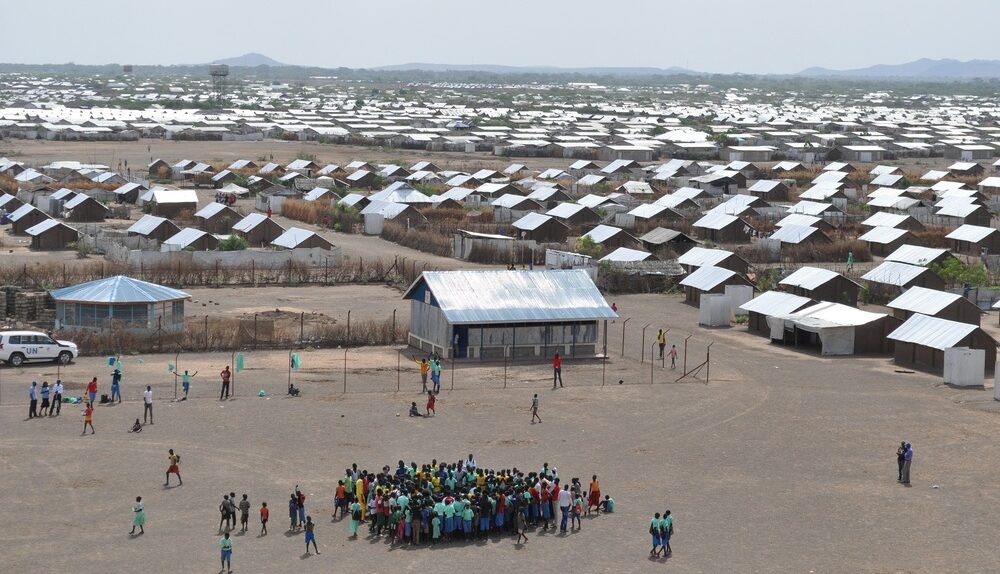The U.S.-based African Human Rights Coalition (AHRC) has praised U.N. efforts on behalf of LGBTQ refugees in Kenya while also calling out fraudsters who harm LGBTQ refugees by diverting funds from naive well-wishers in the West. The AHRC, which raises money to assist LGBTQ refugees in Kenya, said that fraudulent fundraising schemes damage legitimate organizations’ efforts to provide humanitarian services.

Kakuma Refugee Camp (Photo courtesy of Pan-African ILGA)
In a blog post, the AHRC praised the Office of the U.N. High Commissioner for Refugees (UNHCR) for its work on behalf of LGBTQ refugees in Kenya despite its limited budget and Kenya’s pervasive homophobia.
The AHRC criticized the United States and Canada for not doing more to help LGBTQ refugees, in particular “for not doing enough to open pipelines for LGBTQI+ refugees in Kenya and failing to bring effective diplomacy with Kenya’s Government to find durable solutions for LGBTQI refugees.”
It criticized Kenya for enacting Subsection 19(2) in the Refugees Act of 2021, which allows refugees to be sent back to their home country if they are found to have engaged in conduct “contrary to public morality”.
It also leveled criticism at people in the West who naively donate to fraudulent LGBTQ causes and spread misinformation, which the AHRC said has provoked Kenyan officials into passing Subsection 19(2) because of the “opportunism, criticism, lies, protests and instigation … that have brought unwanted negative attention to a government which does not want to be exposed as helping LGBTQI+”.
The AHRC statement came in response to a “briefing note” from the UNHRC that provides an overview of its work with refugees in Kenya. The UNHRC stated:
-

Logo of the Office of the U.N. High Commissioner for Refugees.
Efforts are under way to minimize the possibility that LGBTQ refugees will be expelled under Subsection 19(2). Those efforts are focused on the regulations that are being drafted to guide Kenyan officials on implementation of the new Refugees Act, including Subsection 19(2).
- The more than 550,000 refugees in Kenya include about 800 self-identified LGBTQ refugees who “have sought international protection because of persecution based on their LGBTIQ+ profile”. The UNHCR “makes every effort to ensure their individual protection needs are addressed.” However, Kenya’s Department of Refugee Services, not UNHCR, handles registration and refugee status determinations. As a result, “UNHCR does not have the authority to expedite the processing of specific cases.”
- Kenya has not yet determined the refugee status of more than 64,000 asylum-seekers, including many from the LGBTQ community.
- Kenya is the only country in East Africa that accepts asylum claims on the basis of sexual orientation and/or gender identity.
- In the Kakuma and Dadaab refugee camps, “for safety reasons and to avoid attracting unwarranted attention, LGBTIQ+ refugees are not concentrated in specific locations of the camps but are instead integrated within the broader refugee community, though a small group has preferred to settle together in an area known as ‘Block 13’ of Kakuma Camp.”
- Working with local authorities, UNHCR has attempted to increase security of LGBTQ refugees in the camps through added police patrols, community volunteers, a free countrywide helpline, temporary shelters and individual counseling.
- UNHCR programs provide refugees with vocational training and income-producing work in hairdressing, tailoring, basic computer skills, soap and detergent production, catering and poultry raising.
- Worldwide, fewer than 0.5 percent of refugees are resettled each year.
- “UNHCR remains deeply concerned about the spread of incorrect information on social media regarding the LGBTIQ+ situation in Kakuma“, including reports of involuntary “outing” of LGBTQ refugees. The agency urged people on social media to verify information about Kenya through “diverse sources” because “the situation is very complex, and the spreading of misinformation undermines our continued and collective efforts to protect those in need”.
Source: African Human Rights Media Network member Erasing 76 Crimes.
COMMENTS